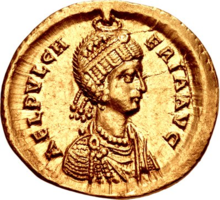
Back بلخريا Arabic بلخريا ARZ Pulqueria AST Pulxeriya Azerbaijani Пульхерыя Byelorussian Елия Пулхерия Bulgarian Aelia Pulcheria Breton Pulquèria Catalan Aelia Pulcheria Czech Aelia Pulcheria Danish
| Pulcheria | |
|---|---|
| Augusta | |
 Solidus of Pulcheria | |
| Roman empress | |
| Tenure | 25 August 450 – July 453 |
| Born | 19 January 398 or 399 Constantinople |
| Died | July 453 (aged 53–55) Probably Constantinople |
| Spouse | Marcian |
| House | House of Theodosius |
| Dynasty | Theodosian |
| Father | Arcadius |
| Mother | Aelia Eudoxia |
| Religion | Nicene Christianity |
Aelia Pulcheria (/ˈiːliə pʌlˈkɪriə/; Ancient Greek: Πουλχερία; 19 January 398 or 399 – 453) was an Eastern Roman empress who advised her brother, the emperor Theodosius II, during his minority and then became wife to emperor Marcian from November 450 to her death in 453.
She was the second (and oldest surviving) child of Eastern Roman Emperor Arcadius and Empress Aelia Eudoxia. In 414, the fifteen-year old Pulcheria became the guardian of her younger brother Theodosius II[1] and was also proclaimed Augusta. Through her religious devotion and involvement in the contemporary ecclesiastical scene, Pulcheria had significant, though changing, influence during her brother's reign. After Theodosius II died on 26 July 450, Pulcheria married Marcian on 25 November 450, while simultaneously not violating her vow of virginity. She died three years later, in July 453.
Pulcheria influenced the Christian Church and its theological development by being involved in the Council of Ephesus and guiding the Council of Chalcedon, in which the Church ruled on christological issues. The Roman Catholic Church and the Eastern Orthodox Church subsequently recognized her as a saint.
- ^ Holum, Kenneth G. Theodosian Empresses: Women and Imperial Dominion in Late Antiquity. Berkeley and Los Angeles, California: University of California Press, 1982. p. 97